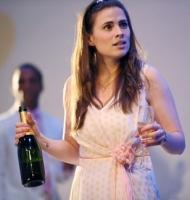The Faith Machine
This new three act play by Alexi Kaye Campbell starts off rather well, and the subject it aims to tackle is both immensely relevant and worthy of consideration. However, the initial promise of the first scene failed to be carried through to the conclusion, leaving me feeling rather underwhelmed and, like one of the main characters, somewhat bewildered.
It all starts in New York where Tom and Sophie have been living together. Sophie is packing her bags and about to move back to England because Tom has become involved in an advertising campaign for a drug company that Sophie disapproves of because of their involvement in various morally questionable activities in developing and marketing their drugs. Tom is unrepentant about his business activities and refuses to comply with Sophie's wishes that he give up the contract. So, they split up.
Next, the location switches to the Greek island of Patmos where Sophie's father, Edward, has retired to live after resigning his position as Bishop in the Church of England. There's also a time-shift involved, because it is now some years before the first scene, and Tom and Sophie are just about to start living together. After forty-seven years of serving the church, Edward has become disillusioned, largely thanks to the church's attitude to gays. But he's not about to be let go so easily, and Patrick (another bishop and long-time friend) has arrived to try and persuade him to withdraw his resignation. Over a meal with Patrick, Sophie and Tom, Edward loses his liberal cool and rails against the greed and selfishness of the market economy. Later, Edward falls victim to a stroke and has to be cared for by Sophie and a reluctant Tom. Later still, Sophie goes off to report from Iraq and Afghanistan where she is shot in the head.
Tom is played by the energetic Kyle Soller who gets rather a verbal pasting from both Hayley Atwell's determined and principled Sophie and Ian McDiarmid's disillusioned Edward. But Mr Stoller shows us that he is not short of fight or spirit, even if he has relinquished his dream of becoming a writer in order to reap the financial rewards of working in big business.
With three acts and a running time not far short of 3 hours, 'The Faith Machine' is too long and rather drifts off course as it moves between locations, times and characters. Though the variety that ensues underlines the diversity of human experiences, it detracts from the essential consideration of why human beings need to believe in something. The result is that the message and moral rather get lost in the proceedings and that is shown clearly in the need for the title to be explained in the final scene. It would have been much better to leave the audience to make up its own mind, rather than having to tell us what we were to conclude about Sophie's attitudes and views about life. The play also moves uneasily between some intense and serious confrontational scenes - for example between Tom and Sophie and where Edward vents his feelings about the church and capitalism - and others, like the gay wedding for example, which only seem to cloud the issue rather than clarifying it.
"Although the piece occasionally meanders, I admire it for its expansive ambition and largeness of spirit...an urgent play that has the courage to address big issues."
Michael Billington for The Guardian
"The writing is studded with smart lines, yet too often it is preachy and contrived."
Henry Hitchings for The Evening Standard
"For all its flaws, worth seeing."
Quentin Letts for The Daily Mail
"I think Campbell is a better dramatist when he keeps his canvas smaller, but there is no doubt that The Faith Machine confirms his talent."
Charles Spencer for The Daily Telegraph
External links to full reviews from popular press
The Guardian - The Guardian
Originally published on
